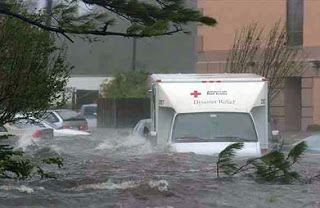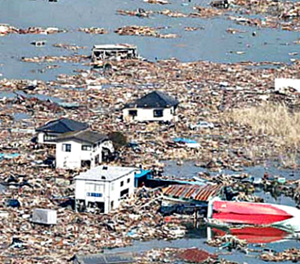 “I had a dream about all these disasters last night,” Jenny says. “It was frightening. There was one disaster after another. I mean I know there have been lots of disasters – floods, hurricanes, earthquakes, tornados – but it was strange for me to be dreaming of them. I don’t know if I was in the disaster or watching the disaster or helping at the disaster. It was weird.”
“I had a dream about all these disasters last night,” Jenny says. “It was frightening. There was one disaster after another. I mean I know there have been lots of disasters – floods, hurricanes, earthquakes, tornados – but it was strange for me to be dreaming of them. I don’t know if I was in the disaster or watching the disaster or helping at the disaster. It was weird.”
Jenny‘s a young medical student. I wonder if, at a surface level, she’s anxious about how she will handle her responsibilities as a physician. I remain silent, waiting to see where Jenny’s thoughts will take her.
“My mother called last night. She was complaining about my step-father for a change, about this step-father, just like she complained about all the others. I don’t know why she keeps marrying them, always sure this one will be her most perfect love. I think I’ve even lost count of what number she’s up to. Ugh. I don’t think I ever want to get married. Or not until I’m really, really sure. I guess I see her as a disaster. That’s sad to say about your own mother. I joke with my friends that she’s my negative role model. I want to be everything she’s not and not be anything she is. Sad.”
“Did you feel that way as a child?” I ask.
“Maybe not as a small child, but before I became a teen-ager for sure. Our house was a revolving door. At least she was smart enough not to have any more kids, except that there were always the so-called Dad’s kids who revolved through and then disappeared forever.”
“Was that hard? Forming an attachment to these father figures or siblings and then having them disappear?”
She shrugs. “I don’t know. Maybe. Or maybe I just learned to do my own thing, be involved with my schoolwork, with my friends. I liked being alone.”
Despite the matter-of-factness in Jenny’s tone, I find myself becoming sad. I wonder about her desire for aloneness as a defense against loss. And I think again about her dream, since disaster almost always involves loss.
“When did you last see your own Dad?”
“Who knows. He vanished a long time ago. Every so often he’ll make an appearance, but I certainly wouldn’t want to count on him.”
“I wonder if it’s possible for you not to feel sad about all these losses, Jenny?”
“I’m too busy.”
To avoid sadness, I think to myself. I ask, “What were the disaster survivors doing in your dream?”

“I was going to say they were doing what disaster survivors always do, dig through their houses looking for stuff, try to find things that are important to them. But I don’t think so. I don’t remember seeing people. It was like one of those apocalyptic novels. Maybe there were a few people, I don’t remember, but basically it was empty, barren.”
“Sounds really sad.”
Silence.
“I just had a weird thought. I wonder if it wasn’t me in all those disasters, but you. Like I was the observer, but you were the one who was there. I wonder what that would mean,” she muses. “I could get it if you’re the one who’s trying to help in the disaster. But would that mean I’m the disaster? I don’t feel like a disaster. So am I trying to reduce you, to make you like me, so I don’t feel like so much of a disaster?” Pause. “I guess that’s possible.”
“Are you saying, Jenny, that it feels like a disaster to need people, to need help, to not want to be all alone in the world?”
“It is a disaster to need people. No one is ever there. You can’t count on anyone. Not your mother, not your father …” Her voice trails off.
“Were you going to say, ‘not your therapist’?”
“Yes,” Jenny says looking down. “I mean I know you’ve been there for me, but you’re only my therapist. Eventually this relationship will end. And then what? Then I’ll be alone. Again. Just like always.”
“It’s hard for you to imagine that even when we do end – which we certainly don’t have to do until you’re ready – that you will take me with you, as part of you, just as a part of you will remain with me.”
“I don’t know if I believe that,” she says. A moment letter, Jenny is crying. “And I’m not sure I even want to believe it,” she says between sobs. “What would that mean, that I would stay with you when my parents could discard me so easily?”
“It would mean that you are loveable and that it was your parent’s great loss that they weren’t able to cherish you as you needed and deserved to be cherished.”
![]()